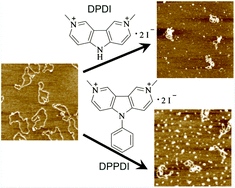Interactions of newly designed dicationic carbazole derivatives with double-stranded DNA: syntheses, binding studies and AFM imaging†
Abstract
The design of small molecular ligands able to bind with DNA is pivotal for the development of diagnostic agents and therapeutic drugs targeting DNA. Carbazole-derivatives are potential agents against tumors and opportunistic infections of AIDS. Here, two carbazole-derived dicationic compounds, DPDI and DPPDI, were designed, synthesized and characterized using NMR, IR and MS. The DNA binding properties of DPDI and DPPDI were sensitive to ionic strength. At low ionic strength, planar and aromatic DPDI had a strongly intercalative interaction with DNA, which was confirmed by circular dichroism (CD) and gel electrophoresis. In DPPDI, a phenyl group substituting H atom at the –NH group of DPDI destroyed molecular planarity, which resulted in no intercalative interactions between DPPDI and DNA, proved by CD. The positive enhancement of CD at 260–270 nm and Hoechst 33258 competitive binding tests indicated the strong groove interactions of both DPPDI and DPDI to DNA. The similarity and difference in the structures between DPDI and DPPDI explained different interaction preferences with DNA. In groove interactions, dications of pyridinium on either DPDI or DPPDI could interact with DNA base pairs, and –NH on DPDI or –N–Ph on DPPDI pointed out of the groove, as the classical model of DNA groove binding agents. Furthermore, AFM imaging revealed that both carbazole-derivatives drove the DNA conformation more compact. All the experimental data proved that the two dicationic carbazole-derivatives interacted with DNA strongly and might act as a novel type of DNA-binding candidate.


 Please wait while we load your content...
Please wait while we load your content...